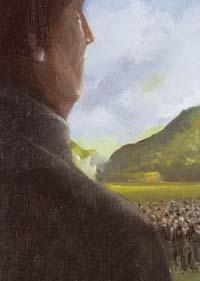|
Catholic Emancipation

The Union of Great
Britain and Ireland came into effect on 1 January 1801. In future Ireland would
have one hundred MPs in the British house of commons, as well as twenty-eight
elected peers and four Protestant bishops in the house of lords. Catholics were
still prevented from sitting in parliament, and indeed were excluded from many
public offices. Comwallis, as lord lieutenant, had pressed for Catholic
emancipation to be included in the terms of the Union which the two parliaments
were asked to agree. However, the British prime minister, William Pitt, was
persuaded that this might be unacceptable to the Protestant MPs in Dublin.
Pitt believed that emancipation would make the Union acceptable to
Irish Catholics and planned to put the necessary legislation before the
enlarged Westminster parliament. The
Catholic hierarchy in Ireland consequently supported the Union. However, there
were many opponents at Westminster, in addition to most of the new Irish MPs.
More important, King George III was implacably hostile to emancipation. When
Pitt found his own cabinet divided on the issue, he resigned in February 1801.
In the aftermath of the 1798 rising, the issue of emancipation was
not of great consequence to the mass of Catholics. However, the Catholic
hierarchy and upper classes, as well as the growing numbers of Catholics in
commerce and the professions, felt some sense of betrayal. The issue continued
to receive attention at Westminster, where Henry Grattan made it his principal
concern, but a number of reforming measures were rejected.
|
The turning point came in 1823, when Daniel O'Connell founded the
Catholic Association. O'Connell, bom
into a prosperous Catholic family in County Kerry, had been educated in France
until forced out by revolutionaries. In Ireland, where he became a successful
barrister, he was critical of the 1798 rising and of the agrarian violence
perpetrated by secret societies such as the Whiteboys and Ribbonmen. By
pursuing peaceful methods, and by mobilising Catholic smallholders and workers
in mass demonstrations, he came to dominate Irish politics for two decades.
The Catholic Association sought not only to remove what remained of
the penal laws, but also to further Catholics' interests at a time when many
were suffering from economic depression and from unsympathetic landlords. When
an annual membership fee of one guinea proved unpopular, O'Connell introduced a
"Catholic rent" of one penny per month, and numbers soared as the
money was collected by parish priests. Although opposed to violence, O'Connell
never hesitated to speak aggressively in depicting Catholic grievances. The
government responded, first by trying to prosecute him, then by banning the
association, but O'Connell was undeterred.

At the 1826 general election, pro-emancipation candidates won
several seats. The most notable success was in County Waterford, where
O'Connell's oratory roused the so-called "forty shilling freeholders"
to vote against a member of the powerful Beresford family, who owned much of
the county. In 1828, O'Connell himself won a by-election in County Clare.
Unable to swear the oath of supremacy, O'Connell could not take his seat, but
the victory persuaded the government led by the Duke of Wellington that
emancipation must be granted.
King George IV reluctantly yielded, and early in 1829 a Catholic
Relief Bill received royal assent. Henceforth Catholics could sit in parliament
without taking the oath of supremacy, and almost every office was open to them.
However, the forty-shillings franchise was raised to ten pounds, so that many
of O'Connell's supporters immediately lost their vote. O'Connell became an influential
MP at Westminster, but failed in his second major campaign. In 1840 he formed
an association to press for repeal of the Union, but lost authority after he
yielded to a government ban on a proposed mass meeting at Clontarf in 1843.
|